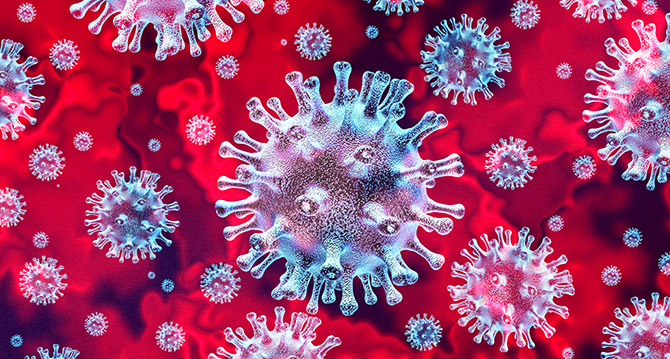Frequent Seasonal Coronavirus Reinfections Hint at Possibility of Endemic COVID-19

New research from Joshua Petrie
Research Assistant Professor of Epidemiology
Reinfections of seasonal coronaviruses are frequent, according to new research that suggests that the coronavirus behind the current pandemic could also produce reinfections.
The study by researchers at the University of Michigan's School of Public Health and collaborators at the National Institutes Health and National Institute of Allergy and Infectious Diseases is published in the Journal of Infectious Diseases.
"There's a hint that there could be SARS-COV-2 reinfections in the future, whether that's because enough time is passed that your immunity has dropped off or that the virus has changed enough that it can escape your immune system," said first author Joshua Petrie, research assistant professor in the Department of Epidemiology at Michigan Public Health.
"The frequency of reinfections with the different seasonal coronaviruses suggests that SARS-COV-2 is not going to completely disappear."
Petrie and colleagues used data from the Household Influenza Vaccine Evaluation, or HIVE, from 2010 to 2018, which included 3,418 individuals. Researchers identified 1,004 seasonal coronavirus infections. Of those, 30% were reinfections and 5% were coinfections with more than one type of coronavirus at the same time. Of the reinfections, 27% occurred within a year of the original infection—a relatively short period given their seasonality.
The researchers also looked at binding antibodies—those that adhere to the coronaviruses—to see whether they offered protection against reinfections.
"In our study, participants had high levels of anti-spike protein binding antibody to seasonal coronaviruses, but these antibodies did not correlate with protection from infection," Petrie said. "This suggests that tests that measure the functional ability of antibodies, rather than just binding, may become more important for SARS-CoV-2."
While researchers have studied previous flu pandemics to understand and prepare for potential outbreaks, the current pandemic is the first documented to be caused by a coronavirus, said senior co-author Arnold Monto, professor of Epidemiology at Michigan Public Health and acting chair of the FDA's Vaccines and Related Biological Products Advisory Committee, which oversees the approval of COVID-19 vaccines.
The researchers looked at existing data for four seasonal coronaviruses that typically cause mild disease in order to gain insights on how the coronavirus might behave in the future.
"We can't say that what is true for these coronaviruses will apply to the novel SARS-CoV-2 virus, but these infections have been in our population for years and they may give us a clue on what we can expect with COVID-19 going forward," said Monto, an internationally known expert on outbreak response and pandemic planning, including transmission modes.
HIVE cohort participants were recruited among families with children in Southeast Michigan. Participants who report acute respiratory symptoms attend an illness visit, during which study staff collect specimens that are tested for respiratory viruses. Beginning in 2011, participants were invited to provide blood specimens for serologic studies in the fall of each year prior to the respiratory virus season and in the spring or summer following each respiratory virus season.
During the pandemic, HIVE was expanded to evaluate the incidence of COVID-19 and transmission within the household setting, especially among people with mild illnesses that may not seek medical care.
The research was funded with federal funds by the National Institute of Allergy and Infectious Diseases (Grant Nos. R01 AI097150 and R56 AI097150 to A.S.M.; K01 AI141579 to J.G.P.) and the National Cancer Institute (Contract No. 75N910D00024, Task Order No. 75N91019F00130).
Monto has received consultancy fees from Sanofi and Seqirus for work unrelated to this report.
In addition to Petrie and Monto, authors included Emily Toth Martin, who co-leads HIVE, and Latifa Bazzi, both of the Department of Epidemiology at Michigan Public Health; Adrian McDermott, Dean Follmann, Christian Hatcher, Sandeep Narpala and Sarah O'Connell of the National Institute of Allergy and Infectious Diseases; and Dominic Esposito and Allyson Mateja of the Frederick National Laboratory for Cancer Research.
